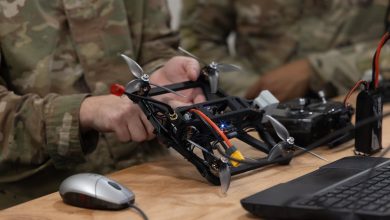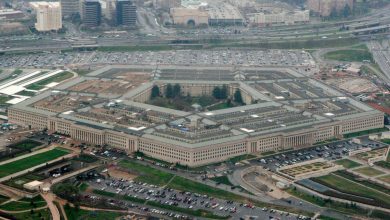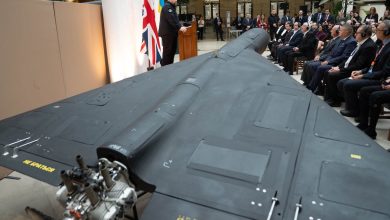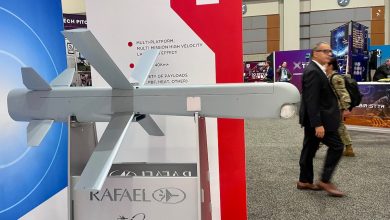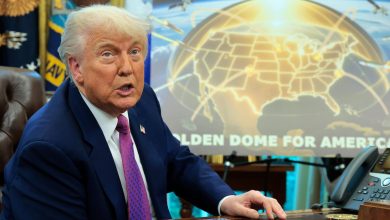Macron, Merz vow closer defense ties in reboot of French-German couple

PARIS — German Chancellor Friedrich Merz traveled to Paris on his first foreign trip as head of government to meet with French President Emmanuel Macron, with the two leaders promising closer defense ties and a reboot of the French-German alliance that has been a driver of European cooperation.
The two countries will accelerate French-German programs to develop capacities that go beyond current programs for next-generation tanks, fighter jets and long-range missiles, Macron said at a press conference here on Wednesday, without providing details.
The countries will also establish a Franco-German defense and security council that will meet regularly to provide “operational responses to our common strategic challenges,” Macron said.
“In the future, we want to use this council to coordinate our support for Ukraine even better, to coordinate our national defense planning and procurement projects even more closely, and to provide new answers to strategic questions of security and defense policy,” Merz said.
Macron said the first responsibility of France and Germany is security in Europe, “and this requires above all our resolute support for Ukraine in the face of Russian aggression.” The countries must continue to respond to Russia’s systemic threat to European security by upping defense investment, the French president said.
Merz called for further increased defense spending in all European Union member states.
“This is the only way we can gradually close our military capability gaps and continue to provide comprehensive support to Ukraine,” he said.
Macron said France and Germany will have to enact the plan by the European Commission to fund priority capability needs and “invest heavily in our European defense industrial and technological base.” The countries will coordinate work on updating their national strategic reviews and share analyses, according to Macron.
“Finally, we will establish a Franco-German defense innovation program to enable the breakthrough innovations needed for tomorrow’s warfare,” Macron said.
Merz said he and Macron agreed on an “a Franco-German new start for Europe,” giving new impetus to the French-German friendship and deepening cooperation at all levels. “Europe must become more competitive, and to do so, it must become more united,” Merz said.
France and Germany will further develop format such as the E3 informal security cooperation with the U.K., as well as the Weimar Triagle alliance with Poland, according to the chancellor.
“We will take joint measures to further expand Europe’s security and defense capabilities and to further strengthen the European pillar within NATO,” Merz said. “This also includes bilateral defense cooperation, which we will deepen and accelerate, as well as cooperation with our European partners.”
Macron said strengthening the European pillar of NATO doesn’t call into question the historical alliances, but is about Europeans assuming more responsibility for themselves.
“In this context, it is entirely natural that all issues should be discussed, including that of nuclear deterrence, with our histories, our specific characteristics and, in France’s case, our status as a state with independent and autonomous capabilities and different components,” Macron said.
Merz said there’s a fundamental need to discuss with France and the U.K. “how we can continue to provide such a deterrent response together in the future,” adding that would be “expressly” intended as a supplement to agreements with the U.S. on nuclear deterrence within NATO.
French and German government leaders, foreign ministers and defense ministers will discuss the nuclear deterrent and other issues in coming weeks and months, according to Merz.
“This is first and foremost a discussion that we will hold together because we want to know what we can do together to strengthen our defense efforts,” the chancellor said, again emphasizing the goal is “expressly not a substitute for the nuclear guarantee” provided by the United States.
The French president said France and Germany will continue to work with the U.S. and willing nations on a ceasefire in Ukraine and to create conditions for just and lasting peace “based on robust security guarantees.” France is “coordinating very closely” with Merz and his teams on the issue, Macron said.
Merz said he‘s planning to visit Ukraine in the coming weeks, with discussions on the details of the visit currently taking place.
The chancellor said that until a lasting ceasefire and an agreement can be reached, the countries can’t provide information on the scope of the security guarantees for Ukraine, “because we simply do not yet know the conditions.”
He said the war in Ukraine cannot be ended without further political and military engagement by the United States.
“We are prepared to do our part on the European side,” Merz said. “But we also know that we still need the Americans. We want the Americans to stay on board, to continue to fulfill their responsibilities within NATO, but also toward Ukraine.”
Macron said he approves of Merz’s desire to recreate “strategic ambiguity” regarding aid provided to Ukraine, including Taurus missiles.
“We would be crazy to give out categories of weapons, delivery dates, and models at every press conference, because the Russian army may be listening to the answers to your questions and sometimes to your questions as well,” Macron said.
Merz, who had floated the idea of giving Taurus long-range cruise missiles to Ukraine in past months, was noncommittal on the issue in his first German TV interview as chancellor on Tuesday, the day he was sworn in.
Asked about prospective Taurus deliveries, he said only that Ukraine would be able to rely on him and Germany. His predecessor, Olaf Scholz believed giving Taurus to Ukraine would be impossible as a stand-alone weapon, pulling German military-support elements into the fight directly.
Macron and Merz published a joint op-ed in conservative-leaning French daily Le Figaro on their plan to reboot French-German cooperation, with a goal of making Europe more sovereign and to promote its interests.
As European countries spend on their defense capabilities, France and Germany will promote a European preference, the leaders said. Europe has to reduce its strategic dependencies as well as the number of defense systems, creating standardization and interoperability, according the president and the chancellor.
Rudy Ruitenberg is a Europe correspondent for Defense News. He started his career at Bloomberg News and has experience reporting on technology, commodity markets and politics.


